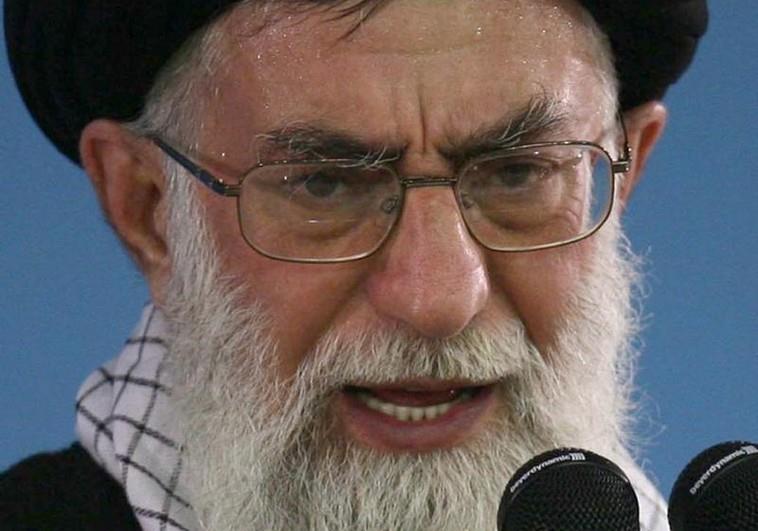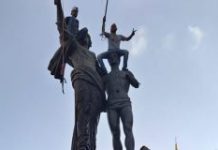Talkers Vs. Deciders in Iran’s Foreign Policy
Amir Taheri/Asharq Al Awsat
Friday, 3 Apr, 2015
Who is in charge of Iran’s foreign policy?
Over the years the question has been posed by almost everyone who has had to deal with the Islamic Republic but no consensus on an answer has been reached.
The question was constantly present in filigree during the latest over-hyped marathon talks on Iran’s nuclear program as the P5+1 ministers often had to wait for their Iranian counterpart to withdraw from various sessions ostensibly for prayers but, in fact, to telephone Tehran and ask for instructions. It was obvious that even on fairly simple issues Zarif had to seek authorization from unidentified authorities back home.
The whole thing assumed an even more bizarre aspect when President Hassan Rouhani insisted that his brother Fereidoun be present and directly report to him, presumably because the foreign minister reported to someone else. Another member of the Iranian team who made his own separate phone calls to Tehran was Deputy Foreign Minister Abbas Araqchi who is cast as the conscience of the Iranian delegation and reported to be charged with the task of preventing Zarif from giving away all family silver. Iranian sources say Araqchi reported to the “Supreme Guide” through Khamenei’s foreign policy advisor Ali-Akbar Velayati.
Sometimes, the fact that the official facade of Iranian diplomacy doesn’t quite know what is going on is starkly demonstrated. One example concerns the current crisis in Iraq.
For weeks, the official media was abuzz with reports regarding Iran’s role as “liberator” of Iraqi territories captured by the so-called Islamic State of Iraq and Syria (ISIS). General Qassem Suleimani, commander of the Quds Corps who is in charge of “exporting the revolution” has been photographed and filmed in a variety of designer combat outfits supposedly leading the Iraqi army and militias to one victory after another. At the same time, Tehran newspapers ran traditional obituaries announcing the “martyrdom” of Iranian troops and officers supposedly involved in the Iraqi war. The daily Kayhan, published under the supervision of “Supreme Guide” Ali Khamenei was hard pressed for superlatives to describe Iran’s involvement in “saving Iraq”. It was not until Suleimani had to run away from a base he had set up near Tikrit that talk about his being Iran’s greatest military genius since Cyrus the Great subsided.
However, Rouhani’s senior advisor Ayatollah Ali Yunessi went even further by pretending that Iran had already “liberated” Iraq and that Baghdad was now “our capital”. “We achieved what the Americans failed to do,” he boasted. And, yet; the Foreign Minister Muhammad Javad Zarif was repeating he Westphalian mantra about “non-intervention in the domestic affairs of other nations.” His spokesperson Marzieh Afkham, a gentle lady who blushes like a bride when she has to doctor the truth was ordered to deny that Iran had any military role in Iraq beyond “offering advice”.
Here is another example of the fog that envelopes policy-making process in Tehran. Last month a large delegation of Houthis from Yemen suddenly appeared in Tehran and within 48 hours negotiated and signed 11 treaties and contracts with various organs of the Iranian state on a range of issues including military cooperation, air transport services, and the training of Yemeni religious scholars. Again, foreign ministry sources claim that the official diplomatic service was either completely shut out of the process or allowed a minor protocol role.
Throughout their stay in Tehran and in a subsequent hop-in-hop-out call on Moscow arranged by Tehran, the Houthi delegation was chaperoned by the Quds Force. It was also the Quds man in Caracas who was given the task of securing diplomatic recognition by Venezuela and other leftist Latin American governments for the Houthi regime in Sana’a. Whenever Hezbollah leaders of the various branches of Hezbollah from different countries, most notably Lebanon, visit Tehran on business they are entirely chaperoned by the Quds Force, the security services and the office of the “Supreme Guide”, and not the official diplomatic service. Foreign ministry sources claim that they don’t even know the size of the checks that are being signed off on in Tehran for the various regional Hezbollah leaders.
Even on the nuclear issue, the official diplomatic service is informed on a need-to-know basis only. Two months ago the security services arranged strictly supervised visits to two nuclear centers for Zarif and his negotiating team. For the rest, they have asked the Zarif team to refer any queries to Ali Akbar Salehi, head of the Atomic Energy Organization who eventually joined the negotiating team in Switzerland. The fact is that Zarif and presumably even Rouhani do not have a complete picture of Iran’s nuclear program.
Another example came late last month in the form of a terse note to the foreign ministry, ordering it to “ establish maritime frontiers” with the neighboring Sultanate of Oman through negotiations within three years but on the basis of a map already provided by the Ministry of Defense. In other words, what the foreign ministry is asked to do is to force the Omanis to sign on what has already been decided. The map in question would substantially change the status quo in the Strait of Hormuz, the Gulf of Oman and further down even in the Arabian Sea where Iran has a few miles of coast at Gawadar on the Pakistani frontier. According to the new map a number of Omani islands and atolls would fall within Iranian territorial waters. One consequence of this could be Iran establishing full control on the Strait of Hormuz from both south and north.
What the foreign ministry is asked to do is to inform Oman of a diktat, something professional diplomats are loath to do. On all sensitive issues, dealing with the Islamic Republic is always difficult and its outcome never certain because outsiders have to deal with a regime suffering from split personality. This is a regime that is torn between acting as a nation-state and pretending to be a vehicle for global revolution. One Iran is represented by smiling diplomats, often with American accents and even US Green Cards. They are “the talkers”. Another Iran is represented by shadowy figures who could be called “the deciders” and, in terms of actual power provide the backbone of the “deep state “in the Khomeinist system. John Kerry hopes to get a Nobel Peace Prize thanks to “the talkers”. But the Iranian nuclear program, designed ad controlled by “the deciders” will continue.
















